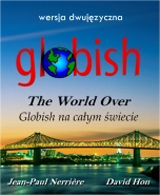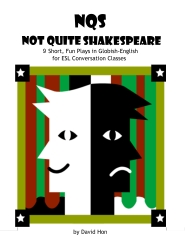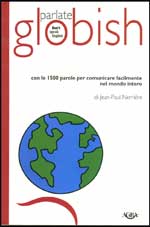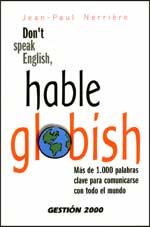Pour ceux qui parlent anglais et qui doutent: un descriptif bref et original de cette langue.
Certains lecteurs pensent parler l’angloricain, et peut-être même l’anglais correctement ; ils pourraient supputer que les choses sont bien ainsi, et ils répugneraient à progresser dans le sens réducteur du globish en n’y anticipant qu’une très probable reculade personnelle. Il leur est suggéré de méditer l’analyse ci dessous (in English car intraduisible), trouvée parmi les morceaux humoristiques disponibles sur l’un des sites animés par les promoteurs de Basic English que j’ai déjà cités.
Here’s an excerpt from the opening chapter in my Crazy English: the Ultimate Joy Ride Through Our Language (Pocket Books, 1989). If you see this floating around the Net unattributed, please suggest to the webmaster of that site that the material be properly cited.
English is a Crazy Language (Part I)
July 1, 1996
English is the most widely spoken language in the history of our planet, used in some way by at least one out of every seven human beings around the globe. Half of the world’s books are written in English, and the majority of international telephone calls are made in English. English is the language of over sixty percent of the world’s radio programs. More than seventy percent of international mail is written and addressed in English, and eighty percent of all computer text is stored in English. English has acquired the largest vocabulary of all the world’s languages, perhaps as many as two million words, and has generated one of the noblest bodies of literature in the annals of the human race.
Nonetheless, it is now time to face the fact that English is a crazy language—the most lunatic and loopy and wifty and wiggy of all languages. In the crazy English language, the blackbird hen is brown, blackboards can be green or blue, and blackberries are green and then red before they are ripe. Even if blackberries were really black and blueberries really blue, what are strawberries, cranberries, elderberries, huckleberries, raspberries, and gooseberries supposed to look like?
To add to this insanity there is no butter in buttermilk, no egg in eggplant, no grape in grapefruit, no bread in shortbread, neither worms nor wood in wormwood, neither mush nor room in mushroom, neither pine nor apple in pineapple, neither peas nor nuts in peanuts, and no ham in a hamburger. (In fact, if somebody invented a sandwich consisting of a ham patty in a bun, we would have a hard time finding a name for it.)
To make matters worse, English muffins weren’t invented in England, French fries in France, or Danish pastries in Denmark. And we discover even more culinary madness in the revelations that sweetmeat is made from fruit, while sweetbread, which isn’t sweet, is made from meat.
In this unreliable English tongue, greyhounds aren’t always grey (or gray); panda bears and koala bears aren’t bears (they’re marsupials); a woodchuck is a groundhog, which is not a hog; a horned toad is a lizard; glowworms are fireflies, but fireflies are not flies (they’re beetles); ladybugs and lightning bugs are also beetles (and to propagate, a significant proportion of ladybugs must be male); a guinea pig is neither a pig nor from Guinea (it’s a South American rodent); and a titmouse is neither mammal nor mammaried.
Language is like the air we breathe. It’s invisible, inescapable, indispensable, and we take it for granted. But, when we take the time to step back and listen to the sounds that escape from the holes in people’s faces and to explore the paradoxes and vagaries of English, we find that hot dogs can be cold, darkrooms can be lit, homework can be done in school, nightmares can take place in broad daylight while morning sickness and daydreaming can take place at night, tomboys are girls and midwives can be men, hours—especially happy hours and rush hours—often last longer than sixty minutes, quicksand works very slowly, boxing rings are square, silverware and glasses can be made of plastic and tablecloths of paper, most telephones are dialed by being punched (or pushed?), and most bathrooms don’t have any baths in them. In fact, a dog can go to the bathroom under a tree—no bath, no room; it’s still going to the bathroom. And doesn’t it seem a little bizarre that we go to the bathroom in order to go to the bathroom?
Why is it that a woman can man a station but as man can’t woman one, that a man can father a movement but a woman can’t mother one, and that a king rules a kingdom but a queen doesn’t rule a queendom? How did all those Renaissance men reproduce when there don’t seem to have been any Renaissance women?
A writer is someone who writes, and a stinger is something that stings. But fingers don’t fing, grocers don’t groce, haberdashers don’t haberdash, hammers don’t ham, and humdingers don’t humding.
If the plural of tooth is teeth, shouldn’t the plural of booth be beeth? One goose, two geese—so one moose, two meese? One index, two indices—one Kleenex, two Kleenices? If people ring a bell today and rang a bell yesterday, why don’t we say that they flang a ball? If they wrote a letter, perhaps they also bote their tongue. If the teacher taught, why isn’t it also true that the preacher praught? Why is it that the sun shone yesterday while I shined my shoes, that I treaded water and then trod on the beach, and that I flew out to see a World Series game in which my favorite player flied out?
If we conceive a conception and receive at a reception, why don’t we grieve a greption and believe a beleption? If a horsehair mat is made from the hair of horses and a camel’s hair brush from the hair of camels, from what is a mohair coat made? If adults commit adultery, do infants commit infantry? If olive oil is made from olives, what do they make baby oil from? If a vegetarian eats vegetables, what does a humanitarian eat? (And I’m beginning to worry about those authoritarians.)
And if pro and con are opposites, is congress the opposite of progress?
Le globish, c’est moins empesé, c’est moins fou, et çà arrive droit au but, partout…








 Globish
Globish Japanese
Japanese Chinese
Chinese Spanish
Spanish







 Les deux éditions
Les deux éditions Parution en Italie
Parution en Italie Parution en Espagne
Parution en Espagne
 Les deux éditions
Les deux éditions